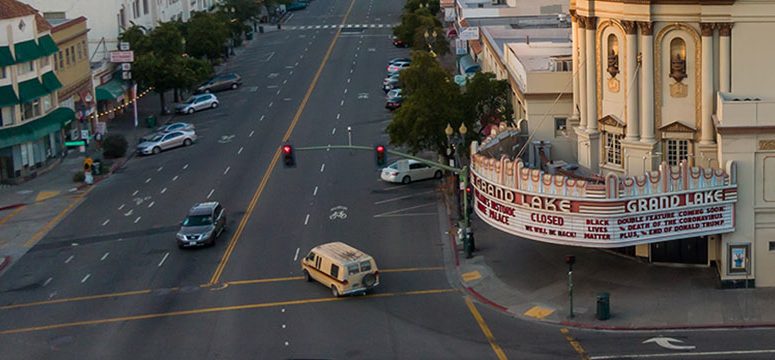Congratulations to two Bay Area bicycle advocacy organizations who won top awards from the Alliance for Biking and Walking at the National Bike Summit in Washington, D.C., this week.
Bike East Bay and the San Francisco Bicycle Coalition were both celebrated for the work they've done to improve, encourage, and support bicycling in the Bay Area.
Bike East Bay won “Winning Campaign of the Year” for its work to help pass Measure BB, a local sales tax increase that will invest $8 billion in transportation in Alameda County over the next 30 years.
The San Francisco Bicycle Coalition brought home the “Advocacy Organization of the Year” award for its stellar year, which included getting city departments on board with Vision Zero (although there's always more work to be done), the successful campaign for transportation bond Measure A, and the completion of bikeways and street designs that the coalition had urged the city to undertake.
Winning Campaign: Bike East Bay
Measure BB, passed November 2014, will quadruple the amount of bike and pedestrian funding available in Alameda County. Jeff Miller of the Alliance for Biking and Walking said, “This is the biggest financial win of any [bike] organization we know of.”
Bike East Bay won the award for the work it put into the winning campaign, including bringing together partner organizations, making sure the measure had a wide base of support, and getting out the vote.
Because it is a local sales tax measure, BB required at least two-thirds voter approval to pass, and it won with almost 70 percent of the vote, an impressive feat in a low-turnout election. A similar measure in 2012 had come very close to winning, missing by a tiny percentage in the final tally. This time around, Bike East Bay and its partners didn't want to relive that depressing scenario.
“The consultants told us that twenty percent of voters will automatically vote 'no' on any tax, no matter what it's for,” said Dave Campbell, Bike East Bay's Advocacy Director. “Polls told us that we had about 68 percent support, but we decided we had to increase the window for winning as much as possible.”
To do that, Bike East Bay reached out to other organizations. Campbell gives credit to the Sierra Club, the League of Women Voters, and local labor organizations for helping the measure pass. “The Sierra Club was neutral in the last campaign,” he said, “so we reached out to them and talked about how Measure BB would improve transit--and match their own environmental policies.”
Local labor groups were convinced that the measure's investments would create good jobs, and their members spent time knocking on doors and talking to people to raise awareness of the measure.
“We targeted everyone, especially swing voters,” said Campbell. “We wanted everyone to be talking about it, and didn't want them to be at risk of being swayed by anti-tax campaigners.”
The measure included a wide range of benefits for voters throughout the county, which also helped gain support. Over $1 billion of the measure's revenue will go for bike improvements alone. Almost half will go towards transit service improvements, fare pass programs for youth, seniors, and disabled, and BART expansions. Another 30 percent will go to local streets and roads, for maintenance and safety improvements—and some road widenings. The list of projects was included on the ballot measure, so that voters could see how they would personally benefit.
Even the highway projects in the measure, about nine percent of the total project funding, bring some benefits for active transportation. All of the highway projects in Measure BB focus on old freeway interchanges that need improvements. “These interchanges cause bottlenecks, and upgrading them to match the quality of nearby streets is a good idea,” said Campbell. “And every single one of them will get a good bike path.”
Campbell sees the local victory as a lesson for other areas considering trying to pass similar measures. “This is a national conversation,” he said. “State budgets are tight, and the federal government is not directing as much money to transportation as it used to. All over the country they're having the same conversation about how to augment transportation funding.”
Advocacy Organization of the Year: San Francisco Bicycle Coalition
The San Francisco Bicycle Coalition was recognized for having a banner year in its hometown. After years of work, the coalition saw some of its hard-fought battles for better bicycle facilities start to produce results.
“It was an amazing honor,” said the Coalition's new Executive Director, Noah Budnick. “The award is a testament to all the work Leah [Shahum, SFBC's former Executive Director] has done. Last year was a huge year for the bike coalition, with the Vision Zero announcement from city hall, with winning the Prop A bonds, and the organization and outreach for key projects like Polk Street.”
The coalition also saw the long-awaited completion of the Cesar Chavez Street project, with a new bike lane, improved sidewalks, bulbouts, rain gardens, and slowed-down traffic speeds—and an increase of bicycle riders on that corridor of 400 percent, according to city counts. A new buffered bike lane on San Jose Avenue filled in a gap in the coalition's Connecting the City campaign, an ambitious vision for 100 miles of crosstown bikeways that are safe for all users.
“The city is such a great place to ride,” said Budnick. “It's a year-round biking city, and it's also a city of neighborhoods, where a lot of very convenient cycling can happen in the daily course of going to the store, or to the park, and all made possible by safe streets.”
“With the city's commitment to Vision Zero, and the passage of Prop A with 75 percent of the vote, it's clear that these are political priorities and a public mandate.”
Email tips, alerts, press releases, ideas, etc. to melanie@streetsblog.org.
For social media coverage focused on statewide issues, follow Melanie @currymel on Twitter or like our Facebook page here.






